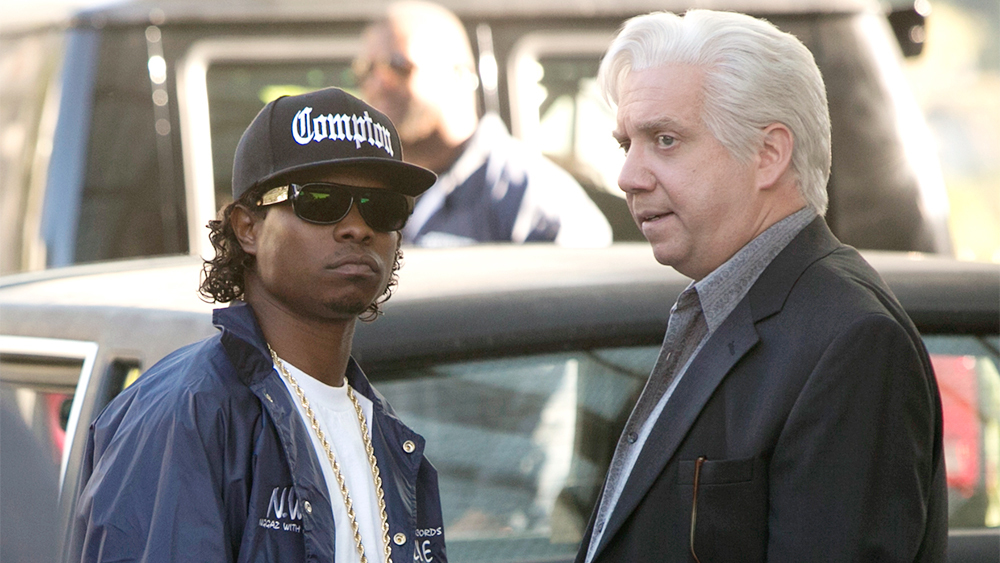
I am taking notes/quoting from this website: https://www.vox.com/2015/8/25/9205595/compton-movie-misogyny
The Film’s Success:
“For the second week in a row, Straight Outta Compton was the most-watched movie in America. It’s made an estimated $111 million since it opened August 14. To get to the $100 million mark means the N.W.A bio-drama has crossed demographics and transcended its genre — it’s not just rap aficionados watching the movie. It means that people who are unfamiliar with Dr. Dre, Eazy-E, and Ice Cube are learning about them for the very first time. It means that people in suburban America are seeing this film. It means that people are listening to Dr. Dre’s new album. It means that Compton has defied the expectations of an industry.”
The Film and Racism:
“At its heart, the film is about black survival in America. It makes no attempt to explain the origins of institutionalized racism or how we arrived to the time we’re in. Instead, it treats racism as it is — an inescapable force that haunts black men and women in America. Compton’s success is as much a testament to the talent of N.W.A as it is a celebration of overcoming the struggle of life in the inner city.”
Dr. Dre and His History With Women, and Representation of Women in Hip Hop:
“But one story that Compton didn’t tell is getting almost as much attention as the film’s success. That’s the story of Dr. Dre’s history of violence against women, which the film doesn’t touch upon. The omission has sparked a new examination of his life, his songs, and his lyrics. It’s ignited broader questions about why the film omitted this horrible chunk of history.”
“Barnes came forward and wrote the essay because her abuse wasn’t depicted in the movie. Barnes explains she didn’t think there would be a reenactment of her abuse; that might be too difficult and graphic for a film to handle delicately. Rather, she writes, she expected and wanted to see some acknowledgment of Dre’s history of violence against women./Barnes isn’t the only woman Dre has assaulted. Michel’le (Michelle Touissant), a singer and Dre’s former fiancée, told hip-hop site VladTV that she didn’t expect to be in the movie or for it to acknowledge her abusive relationship with Dre. “If they start from where they start from, I was just a quiet girlfriend who got beat up and told to sit down and shut up,” she said.”
“Not acknowledging Dre’s violence is attributed to the fact that Dre and Ice Cube are producers on the film. The concern is that they — as with anyone producing his own biopic — won’t be or can’t be objective when presenting themselves and their history.”
“While it’s easy to see why Ice Cube and Dr. Dre wouldn’t want to include the dark spots of their histories, it’s a bit more difficult to figure out why critics didn’t bring it up in their reviews.”
“This isn’t to say that Compton is a bad film. It’s not. But there isn’t anything wrong in asking why this story is being told in a way that evades a major part of the stories about these men and the art they created. The failure of these critics to mention N.W.A’s misogynistic songs poses a question about whether critics have a responsibility to do so.”
“On Friday, just before the movie’s second weekend, Dre acknowledged the movie’s sidestepping of misogyny and his abusive past. “Twenty-five years ago I was a young man drinking too much and in over my head with no real structure in my life. However, none of this is an excuse for what I did,” Dre told the New York Times, responding to Barnes’s article and the women who came forward to speak about the violence Dre inflicted on them.”
“If hip-hop is about truth, then the truth for these men at this point in their lives was that women were, at best, disposable sex toys or, at worst, conniving traps. And it’s not like Dr. Dre and Ice Cube weren’t influential or their misogynistic lyrics weren’t a huge part of their success. The popularity of these lyrics crystallized an idea of robbing humanity from black women — something that artists after them (including Dre’s protégés) would mimic.”
“Not depicting the misogyny these men are responsible for is essentially saying these women, especially black women, don’t matter. If we’re a society that sadly needs massive amounts of evidence (see: Cosby) of women being beaten or sexually assaulted to believe their stories, then Compton‘s evasion of the issue again reaffirms a message that women are irrelevant. That’s its own kind of abuse.”
